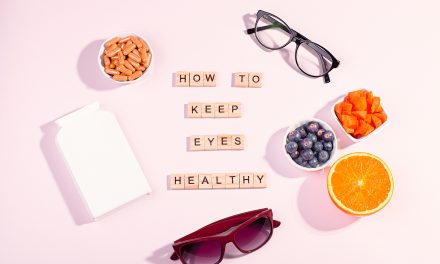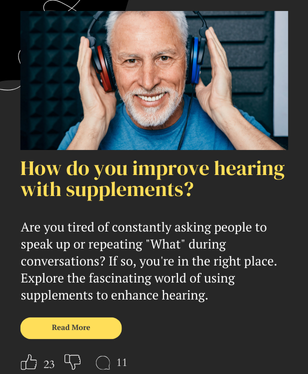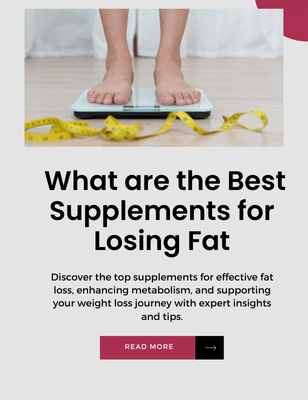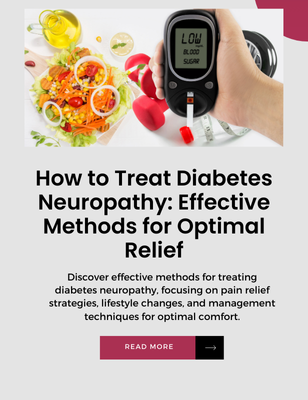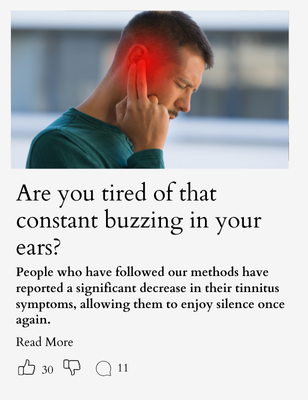Maintaining eye health is a growing concern as the average screen time increases and our populations age. People are seeking ways to protect their vision and reduce the risk of eye diseases, as well as potentially improve their eyesight. Amidst the many strategies to support eye health, dietary supplements have garnered significant attention. These supplements often contain a variety of nutrients that are touted for their benefits to eye health.
The best supplement to improve eyesight should include critical nutrients identified by research to support vision health. Essential vitamins and minerals like vitamin A, vitamin C, zinc, and the carotenoids lutein and zeaxanthin play a role in maintaining the structure and function of the eyes, especially in conditions like age-related macular degeneration. The efficacy of supplements in improving eyesight varies, with some studies showing benefits while others suggest the need for more evidence.
Key Takeaways
- A suitable eye supplement should be rich in vitamins and carotenoids proven to support eye health.
- The impact of supplements on eyesight improvement varies, indicating the importance of a well-rounded diet.
- Regular consultation with healthcare professionals is advisable when considering eye supplements.
Understanding Eye Health
To maintain optimal eye health and vision, one must consider various factors, such as the specific role of eye structures, common diseases that can impair eyesight as we age, and the vital role of nutrition in preserving vision.
The Role of the Macula in Vision
The macula is a critical component of the retina, essential for sharp, central vision needed for activities like reading and driving. It contains a high concentration of photoreceptor cells, which convert light into electrical signals that the brain interprets as images. Damage to the macula can significantly impair one’s quality of vision.
Common Age-Related Eye Diseases
Age-related eye diseases, such as age-related macular degeneration (AMD), are leading causes of visual impairment and blindness in older adults. This condition is characterized by the deterioration of the macula, resulting in a loss of central vision. Other common age-related eye diseases include cataracts and glaucoma, both of which can also lead to reduced visual acuity if not appropriately managed.
Importance of Nutrition for Eye Health
Nutrition plays a crucial role in supporting eye health. Essential nutrients such as lutein and zeaxanthin, found in leafy greens and other vegetables, can help protect the macula from damage. Omega-3 fatty acids, vitamin C, and vitamin E are also known to support retinal health and may reduce the risk of chronic eye diseases. Supplements containing these and other antioxidants may offer additional support for maintaining healthy vision, especially for those at risk of nutritional deficiencies.
Key Nutrients for Eye Health
Maintaining eye health is critically dependent on consuming a balanced intake of specific nutrients. These include vitamins, minerals, and antioxidants, each playing unique roles in supporting vision and preventing eye-related diseases.
Vitamins Essential for Vision
Several vitamins are fundamental for maintaining healthy vision. Vitamin A is crucial for good eyesight. It aids in the creation of rhodopsin, a pigment found in the retina that is essential for night vision. Vitamin C contributes to healthy blood vessels in the eyes and may combat the development of cataracts, while Vitamin E has been associated with a reduced risk of age-related macular degeneration (AMD).
- Vitamin A: Necessary for night vision and corneal health.
- Vitamin C: Supports vascular health in the eyes; may help prevent cataracts.
- Vitamin E: Protective against AMD and cataracts.
Antioxidants and Their Protective Effects
Antioxidants play a defensive role by protecting the eyes from oxidative stress and inflammation, which can lead to chronic eye diseases. Carotenoids like lutein and zeaxanthin are powerful antioxidants found in high concentrations in the macula; they filter harmful high-energy blue wavelengths, which are vital in shielding the eyes. Omega-3 fatty acids, specifically DHA, are known for their anti-inflammatory properties and are essential in maintaining retinal health.
- Antioxidants: Protect against oxidative stress and reduce the risk of chronic eye diseases.
- Lutein and Zeaxanthin: Filter harmful blue light and aid in macular health.
- Omega-3 fatty acids: Crucial for retinal health and reducing inflammation.
Minerals and Eye Function
Minerals such as zinc and copper are critical for supporting eye health. Zinc, present within the retina and choroid, the vascular tissue layer underneath the retina, plays a vital role in the formation of visual pigments. Adequate zinc intake is necessary for maintaining the health of these tissues and may help prevent AMD. Copper, often taken with zinc, helps to maintain healthy connective tissue in the eyes.
- Zinc: Integral for visual pigment production; supports retinal health.
- Copper: Contributes to the health of connective tissues within the eye.
These nutrients are obtainable through a well-rounded diet, emphasizing the importance of nutrition for visual health. For an in-depth look into the role of dietary elements in ocular health, one could reference The best vitamins for your eyes – Mayo Clinic Press and The Top 9 Best Vitamins for Eye Health.
Best Supplements to Improve Eyesight
When considering supplements for enhancing vision, the AREDS and AREDS2 formulas stand out for their research-backed support in eye health, particularly for age-related degeneration. Omega-3s are also proven to be vital for maintaining eye health, and while supplements are available, identifying whole food sources is beneficial for overall well-being.
Analyzing the AREDS and AREDS2 Formulas
The Age-Related Eye Disease Studies (AREDS and AREDS2) have identified specific combinations of vitamins and minerals that slow the progression of age-related macular degeneration (AMD). The AREDS2 formula, a revision of the original, includes:
- Vitamin C
- Vitamin E
- Lutein
- Zeaxanthin
- Zinc
- Copper
These ingredients were found to be effective after substantial clinical trials. Lutein and zeaxanthin, in particular, replaced beta-carotene due to the latter’s associated risk in smokers.
Role of Omega-3s in Eye Health
Omega-3 fatty acids, notably DHA and EPA, are critical for retinal health and may help reduce the risk of AMD and dry eye syndrome. They are predominantly found in fish oil but can also be sourced from flaxseed for a plant-based alternative. Regular intake of Omega-3s maintains cell membrane health and offers anti-inflammatory benefits vital for eye tissues.
Supplements vs. Whole Food Sources
Supplementing for eye health is a practical choice for those with a deficiency or specific eye conditions. However, obtaining nutrients from whole food sources can provide additional health benefits. Foods rich in carotenoids such as lutein and zeaxanthin include leafy greens and eggs. For Omega-3s, fatty fish is a superior option, along with nuts and seeds like flaxseed. Vitamin B1, also known as thiamin, which supports overall cellular function, can be found in whole grains, meats, and nuts. Balancing both supplements and foods can optimize eye health and support systemic health.
Effects of Carotenoids on Eye Health
Carotenoids, specifically lutein, and zeaxanthin, are vital nutrients that support eye health and may help slow down the progression of macular degeneration. These antioxidants are found in high concentrations in the retina’s macular region, where they filter harmful blue light and combat oxidative stress.
Benefits of Lutein and Zeaxanthin
Lutein and zeaxanthin are carotenoids that act as antioxidants, protecting the eyes from the harmful effects of oxidation and blue light. Studies have shown that these carotenoids are crucial in maintaining the structure and function of the macula, an area of the retina responsible for central vision. Supplementing with lutein and zeaxanthin has been linked to a decreased risk of chronic eye diseases, notably age-related macular degeneration (AMD). A significant study found that supplements containing lutein and zeaxanthin were more effective and safer than those with beta-carotene for patients with AMD.
Natural Sources of Carotenoids
- Leafy Green Vegetables: Vegetables like kale and spinach are outstanding sources of lutein and zeaxanthin.
- Corn: Yellow corn is another nutritious food known to contain these essential carotenoids.
- Egg yolks: The naturally occurring carotenoids in egg yolks also contribute to the dietary intake of these essential nutrients.
These natural food sources provide an array of carotenoids easily incorporated into a balanced diet to support eye health. Regular consumption of these foods can be a key element in maintaining good vision and may aid in preventing macular degeneration.
The Detrimental Impacts of Blue Light
Exposure to blue light has been a growing concern due to its potentially harmful effects on eye health. It may accelerate the production of free radicals, which can cause damage to the eyes’ sensitive cells.
How Blue Light Affects The Eyes
Blue light, part of the visible spectrum, possesses a short wavelength, resulting in higher energy levels. Studies suggest prolonged exposure to blue light could damage the retinal cells and contribute to conditions such as age-related macular degeneration (AMD). The eye lacks sufficient natural filters to prevent blue light from reaching the delicate retinal tissue, elevating the risk of phototoxicity and potentially exacerbating night blindness.
Protective Measures Against Blue Light
To counter the effects of blue light, one can adopt several practical measures:
- Wear Sunglasses: Choose sunglasses that block out blue light, especially outdoors.
- Antioxidants: Incorporating antioxidants into one’s diet can help mitigate the impact of blue light. These antioxidants can be sourced from a balanced diet rich in pigments like lutein and zeaxanthin, found in leafy greens and various fruits and vegetables.
By understanding the dangers associated with blue light and adopting defensive practices, individuals can safeguard their eyes against the potential adverse effects of modern light sources.
Addressing Specific Eye Conditions
Different eye conditions may benefit from specific dietary supplements. This section focuses on how certain supplements can be aligned with treatments for common eye conditions like dry eye disease, cataracts, and glaucoma.
Supplements for Dry Eye Disease
Dry eye disease commonly causes discomfort and vision problems, which omega-3 fatty acids might alleviate. A proper balance of omega-3s in fish and flaxseed oils can help maintain the eye’s tear film and reduce dryness. Additionally, including fatty acids in one’s diet may support overall eye health.
Nutritional Support for Cataracts
Cataracts, the clouding of the lens, can be influenced by oxidative stress. Antioxidants such as vitamin C, abundant in citrus fruits and leafy greens, may slow the progression of cataracts. Evidence suggests that with increased dietary intake of this nutrient, there’s a lower risk of cataract formation.
Managing Glaucoma Through Diet
Glaucoma, a condition that damages the optic nerve, could be managed with dietary choices to some extent. Antioxidants may support the health of the macula and optic nerve, while omega-3 fatty acids are being studied for their potential to improve intraocular pressure, a critical factor in glaucoma risk. Regular consumption of leafy greens and fruits may have a protective effect as part of a broader glaucoma treatment plan.
Dietary Patterns and Eye Health
The food choices one makes can significantly affect eye health. Proper nutrition and a balanced diet can help maintain good vision and may reduce the risk of certain eye conditions.
Incorporating Eye-Friendly Foods
A diet rich in particular nutrients is beneficial for maintaining and possibly improving eyesight. Incorporating green leafy vegetables such as spinach, kale, and collards is recommended due to their high content of lutein and zeaxanthin—nutrients that can help prevent macular degeneration and cataracts.
Fish high in omega-3 fatty acids, like salmon, tuna, and herring, are known to support eye health. Omega-3s are believed to contribute to visual development and the retina’s health in the back of the eye.
Nuts and seeds, including almonds, walnuts, and flaxseeds, are another excellent source of omega-3 fatty acids and vitamin E, an antioxidant that can protect the eyes from free radicals and may slow age-related ocular changes.
Consuming fruits and vegetables that are rich in color, such as carrots, sweet potatoes, and pumpkins, provides vitamin A and beta-carotene, which are known to help maintain normal vision and eye health.
Including colored fruits and vegetables not only offers aesthetic variety but also comprises a broad spectrum of vitamins and antioxidants beneficial for eye health.
Foods to Avoid for Better Vision
Just as some foods can benefit eye health, others can be detrimental if consumed in excess. Highly processed foods, those high in sugar and fats, can lead to conditions like obesity and type 2 diabetes, which are known risk factors for eye diseases.
It is advisable to moderate the consumption of foods that may contribute to poor eye health and consider healthier alternatives supporting a balanced diet. A mindful approach to nutrition and diet can play an essential role in sustaining good eye function and overall health.
Lifestyle Factors Influencing Vision
In addition to nutrition, various lifestyle choices can significantly impact vision health.
The Impact of Exercise and Weight
Regular exercise can benefit one’s vision by improving blood circulation, essential for eye health. Enhanced blood flow delivers more oxygen and nutrients to the eyes and reduces the risk of diseases that could lead to vision loss. Maintaining a healthy weight also reduces the risk of diseases like type 2 diabetes, the leading cause of blindness in adults.
Smoking and Vision Loss
Smoking is a known risk factor for a variety of vision problems, including age-related macular degeneration (AMD), cataracts, and uveitis. Chemicals in cigarettes can harm the eye’s retina and contribute to the development of AMD, dramatically increasing the risk of vision loss.
Sun Exposure and Eye Protection
Exposure to ultraviolet light (UV) from the sun can damage the eyes and lead to diseases such as cataracts and eye cancers. Wearing sunglasses that block 100% of UVA and UVB rays or a wide-brimmed hat can protect the eyes from harmful UV rays. Additionally, consistent use of these protective measures supports overall heart health by reducing strain on the cardiovascular system.
Professional Advice and Regular Check-Ups
Achieving optimal eye health involves more than supplements; it entails professional guidance and routine monitoring. Experts underscore the importance of seeking advice from an ophthalmologist and the proactive role that regular eye exams play in the early detection and prevention of eye diseases.
When to See an Ophthalmologist
An ophthalmologist should be consulted when there are noticeable changes in vision or during routine health check-ups. They specialize in eye care and are trained to provide a full spectrum of eye care, from prescribing glasses to complex and delicate eye surgery. Individuals with diabetes or a family history of age-related eye diseases, such as macular degeneration or diabetic retinopathy, should see an ophthalmologist regularly. The National Eye Institute recommends that adults get a comprehensive dilated eye exam by age 40 and follow the frequency advised by their eye care professionals based on their risk factors.
The Role of Regular Eye Exams in Prevention
Regular eye exams are crucial for early detection and treatment of eye conditions, potentially saving vision. These exams can reveal early signs of conditions like macular degeneration and diabetic retinopathy, even before symptoms occur. An eye exam can also update prescriptions to ensure optimal vision correction, reducing the risk of eye strain and associated symptoms. Adults over 60, or those at high risk for eye diseases, should have yearly exams, while others may adhere to a schedule recommended by their eye care provider. Regular check-ups enable timely intervention and can help maintain good eye health throughout a person’s life.
Safe Usage of Eye Supplements
When using eye supplements, it’s essential to adhere to recommended dosages and understand the labels to minimize health risks and potential interactions with other medications.
Recommended Dosages and Potential Interactions
Vitamins for eye health, such as those for supporting individuals with cataracts, should be taken within the dosages advised by healthcare providers. Multivitamins often contain the necessary nutrients for eye health, but excess intake can lead to adverse effects or interactions with prescribed medication. For instance, taking high doses of Vitamin E, often found in eye health supplements, can interfere with blood thinners and increase the risk of bleeding.
Zinc, included in many formulas to support age-related eye issues, may decrease copper absorption, so it should be balanced with copper intake. The Mayo Clinic Press suggests little evidence of a link between high doses of specific vitamins and improved outcomes for eye conditions not directly related to nutritional deficiencies.
Understanding Supplement Labels
Labels on eye supplements provide essential information about the contents and recommended dosages. When reading labels, one should look for the Supplement Facts panel, which reveals the amounts of each nutrient per serving and the % Daily Value (%DV). For instance, Cleveland Clinic emphasizes the importance of consulting with a doctor before taking supplements, as the evidence for the benefits of non-prescribed dosages is limited.
Identifying whether a product is a multivitamin or a single-nutrient supplement is crucial to understanding how it fits into one’s overall nutrition plan. Supplements that claim to improve general wellness may not provide information specific to eye health, so choosing products geared toward eye-specific nutrition is essential.
Frequently Asked Questions
In seeking ways to enhance eye health and vision, it’s essential to consider the role of vitamins and diet. The following frequently asked questions provide focused insights into how specific nutrients and supplements can contribute to better eye health.
What are the top eye vitamins for reducing the occurrence of blurry vision?
Vitamin A is crucial for maintaining a clear cornea and is often associated with reduced blurry vision. Other nutrients like omega-3 fatty acids and Vitamin C have been shown to support eye health and potentially decrease blurriness.
How can diet or supplements contribute to vision improvement?
A diet rich in antioxidants, such as lutein and zeaxanthin, found in leafy greens, can protect the eyes from harmful light. Supplements that combine these antioxidants with other eye-friendly vitamins can further improve eyesight.
Are specific vitamins known to aid in the recovery of vision loss?
While vitamins cannot typically restore lost vision, consistent intake of Vitamin E, and zinc may help slow the progression of vision loss in certain conditions such as age-related macular degeneration.
Which supplements are recommended for the prevention of macular degeneration?
Supplements specifically formulated to support eye health, often referred to as AREDS or AREDS2 formula, contain a blend of vitamins C and E, zinc, copper, lutein, and zeaxanthin and are frequently recommended for macular degeneration prevention.
What are some effective PreserVision supplements for eye health?
PreserVision offers supplements like AREDS2 that support eye health and are based on clinical trial formulations designed to prevent eye-related diseases.
Can incorporating certain foods in my diet enhance my eyesight naturally?
Incorporating foods high in Vitamin A, such as carrots, and rich in omega-3 fatty acids, like fish, may enhance eyesight. Consuming fruits and vegetables loaded with antioxidants can also improve overall eye health.










